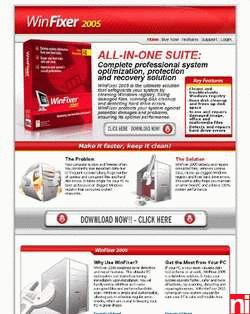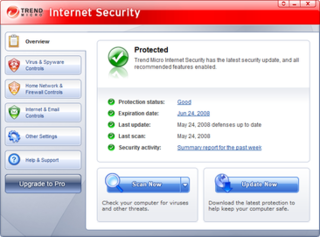Related Research Articles
Adware, often called advertising-supported software by its developers, is software that generates revenue for its developer by automatically generating online advertisements in the user interface of the software or on a screen presented to the user during the installation process. The software may generate two types of revenue: one is for the display of the advertisement and another on a "pay-per-click" basis, if the user clicks on the advertisement. Some advertisements also act as spyware, collecting and reporting data about the user, to be sold or used for targeted advertising or user profiling. The software may implement advertisements in a variety of ways, including a static box display, a banner display, a full screen, a video, a pop-up ad or in some other form. All forms of advertising carry health, ethical, privacy and security risks for users.
Spyware is any software with malicious behavior that aims to gather information about a person or organization and send it to another entity in a way that harms the user by violating their privacy, endangering their device's security, or other means. This behavior may be present in malware and in legitimate software. Websites may engage in spyware behaviors like web tracking. Hardware devices may also be affected.
Claria Corporation was a software company based in Redwood City, California that invented “Behavioral Marketing”, a new form of online advertising. It was founded in 1998 by Denis Coleman, Stanford MBA Sasha Zorovic, and engineer Mark Pennell, based on work Zorovic had done at Stanford. In March 1999 Jeff McFadden was hired as CEO and Zorovic was effectively forced out.

RealPlayer, formerly RealAudio Player, RealOne Player and RealPlayer G2, is a cross-platform media player app, developed by RealNetworks. The media player is compatible with numerous container file formats of the multimedia realm, including MP3, MP4, QuickTime File Format, Windows Media format, and the proprietary RealAudio and RealVideo formats. RealPlayer is also available for other operating systems; Linux, Unix, Palm OS, Windows Mobile, and Symbian versions have been released.

BonziBuddy was a freeware desktop virtual assistant created by Joe and Jay Bonzi. Upon a user's choice, it would share jokes and facts, manage downloads, sing songs, and talk, among other functions, as it used Microsoft Agent.

Spybot – Search & Destroy (S&D) is a spyware and adware removal computer program compatible with Microsoft Windows. Dating back to the first Adwares in 2000, Spybot scans the computer hard disk and/or RAM for malicious software.
Norton AntiVirus is an anti-virus or anti-malware software product founded by Peter Norton, developed and distributed by Symantec since 1990 as part of its Norton family of computer security products. It uses signatures and heuristics to identify viruses. Other features included in it are e-mail spam filtering and phishing protection.

Microsoft Defender Antivirus is an antivirus software component of Microsoft Windows. It was first released as a downloadable free anti-spyware program for Windows XP and was shipped with Windows Vista and Windows 7. It has evolved into a full antivirus program, replacing Microsoft Security Essentials in Windows 8 or later versions.
Norton Internet Security, developed by Symantec Corporation, is a discontinued computer program that provides malware protection and removal during a subscription period. It uses signatures and heuristics to identify viruses. Other features include a personal firewall, email spam filtering, and phishing protection. With the release of the 2015 line in summer 2014, Symantec officially retired Norton Internet Security after 14 years as the chief Norton product. It was superseded by Norton Security, a rechristened adaptation of the Norton 360 security suite.

WinFixer was a family of scareware rogue security programs developed by Winsoftware which claimed to repair computer system problems on Microsoft Windows computers if a user purchased the full version of the software. The software was mainly installed without the user's consent. McAfee claimed that "the primary function of the free version appears to be to alarm the user into paying for registration, at least partially based on false or erroneous detections." The program prompted the user to purchase a paid copy of the program.

Zango,, formerly ePIPO, 180solutions and Hotbar, was a software company that provided users access to its partners' videos, games, tools and utilities in exchange for viewing targeted advertising placed on their computers. Zango software is listed as adware by Symantec, and is also labeled as a potentially unwanted program by McAfee. Zango was co-founded by two brothers: Keith Smith, who served as the CEO; and Ken Smith, who served as the CTO.
Criticism of Windows XP deals with issues with security, performance and the presence of product activation errors that are specific to the Microsoft operating system Windows XP.

Adaware, formerly known as Lavasoft, is a software development company that produces spyware and malware detection software, including Adaware. It operates as a subsidiary of Avanquest, a division of Claranova.
Rogue security software is a form of malicious software and internet fraud that misleads users into believing there is a virus on their computer and aims to convince them to pay for a fake malware removal tool that actually installs malware on their computer. It is a form of scareware that manipulates users through fear, and a form of ransomware. Rogue security software has been a serious security threat in desktop computing since 2008. An early example that gained infamy was SpySheriff and its clones, such as Nava Shield.

PC Tools, formerly known as WinGuides.com, was a software company acquired by Symantec in 2008; the new owner eventually discontinued the PC Tools name. Company headquarters were in Australia, with offices in Luxembourg, the United States, United Kingdom, Ireland and Ukraine. The company had previously developed and distributed security and optimization software for the Mac OS X and Microsoft Windows platforms.
In computing, the term remote desktop refers to a software- or operating system feature that allows a personal computer's desktop environment to be run remotely from one system, while being displayed on a separate client device. Remote desktop applications have varying features. Some allow attaching to an existing user's session and "remote controlling", either displaying the remote control session or blanking the screen. Taking over a desktop remotely is a form of remote administration.
Microsoft Security Essentials (MSE) is a discontinued antivirus software (AV) product that provides protection against different types of malicious software, such as computer viruses, spyware, rootkits, and Trojan horses. Prior to version 4.5, MSE ran on Windows XP, Windows Vista, and Windows 7, but not on Windows 8 and later versions, which have built-in AV components known as Windows Defender. MSE 4.5 and later versions do not run on Windows XP. The license agreement allows home users and small businesses to install and use the product free of charge.

Genieo Innovation is an Israeli company, specializing in unwanted software which includes advertising and user tracking software, commonly referred to as a potentially unwanted program, adware, privacy-invasive software, grayware, or malware. They are best known for Genieo, an application of this type. They also own and operate InstallMac which distributes additional 'optional' search modifying software with other applications. In 2014, Genieo Innovation was acquired for $34 million by Somoto, another company which "bundles legitimate applications with offers for additional third party applications that may be unwanted by the user". This sector of the Israeli software industry is frequently referred to as Download Valley.

Trend Micro Internet Security is an antivirus and online security program developed by Trend Micro for the consumer market. According to NSS Lab comparative analysis of software products for this market in 2014, Trend Micro Internet Security was fastest in responding to new internet threats.
Norton 360 was an "all-in-one" security suite for the consumer market developed by Symantec. Originally released in 2006, it was discontinued in 2014; its features were carried over to its successor, Norton Security. However, in 2019, Symantec released a "NEW Norton 360", as a product replacement for Norton Security.
References
- 1 2 3 4 5 6 Tynan, Dan. "The 25 Worst Tech Products of All Time". PCWorld. Retrieved 2014-08-27.
- 1 2 Elliott, Stuart (1999-11-22). "Internet Company Offers Customized Cursors". The New York Times . Retrieved 2019-07-10.
- ↑ Cheng, Kipp (1999-11-15). "IQ News: 2 Entertainment Sites Make Deal with Comet". Adweek . Retrieved 2019-07-10.
- ↑ Tedeschi, Bob (2001-12-03). "E-Commerce Report; A new feature turns a cursor into an automatic price-comparison service". The New York Times . Retrieved 2019-07-10.
- ↑ "Cursor Software Monitors Customers". The New York Times . The Associated Press. 1999-11-29. Retrieved 2019-07-10.
- ↑ "RealNetworks faced with second privacy suit". CNET News. Archived from the original on 2012-07-17. Retrieved 2014-08-27.
{{cite web}}: CS1 maint: bot: original URL status unknown (link) - 1 2 Coursey, David (2001-01-23). "The mystery of Comet Cursor: How it got on my PC (yours too)". ZDnet . Archived from the original on February 12, 2007.
- ↑ "Spyware.CometCursor". Symantec. Archived from the original on January 8, 2007. Retrieved 2014-08-27.
- ↑ "Versions of Comet Cursor That Are Earlier Than Version 4.0 Cause an Error Message". Archived from the original on 2008-12-20. Retrieved 2009-01-16.